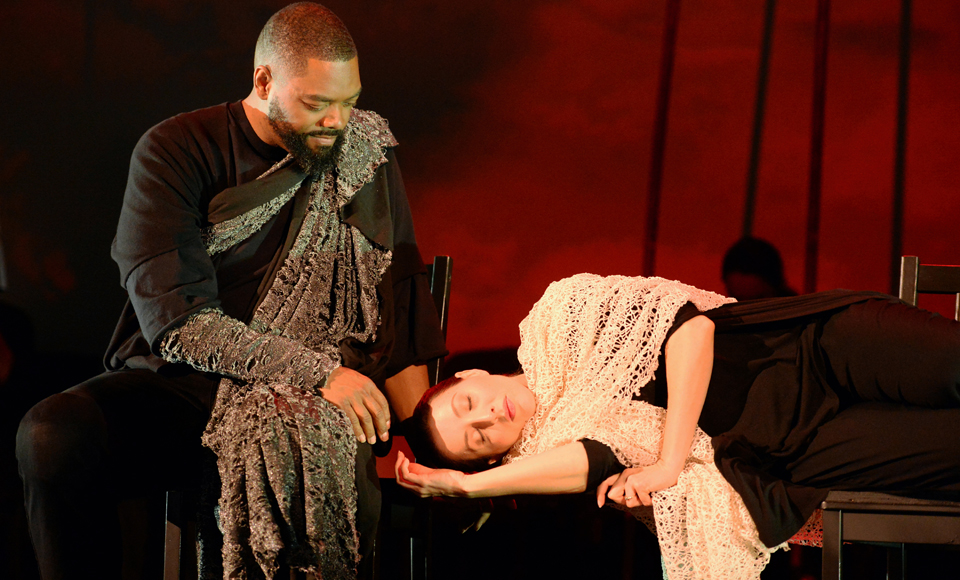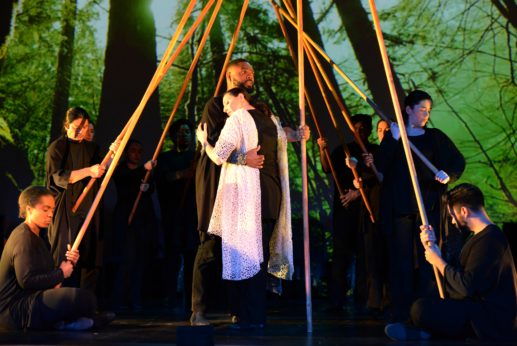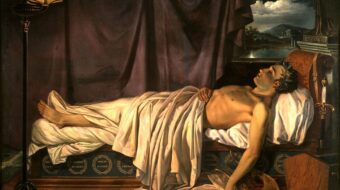
LONG BEACH, Calif.—What Richard Wagner does in five hours, Swiss composer Frank Martin does in under two.
Le Vin Herbé (The Love Potion) premiered in its complete version in 1942 and is based on The Romance of Tristan & Iseult, a retelling of the Tristan legend that historian and medievalist Joseph Bédier published in 1900.
As opposed to Wagner’s huge orchestral forces and heroic-sized voices, Martin (1890-1974) uses twelve singers as both the soloists and as chorus, much in the manner of ancient Greek tragedy. A small ensemble of seven strings and a piano support the mood and action of the drama.
The composer, who lived and taught in the Netherlands for the majority of his life, consciously chose to make his version of the famous story as un-Germanic as possible, distancing himself from Teutonic culture as the Nazis were taking over most of Europe. Switzerland remained a neutral country.
The story is not in fact originally German. It first appears in Old French literature in the year 1150. The nationalities and the locale are not German either. Isolde (to use the more familiar spelling) is Irish, and is betrothed to Cornish King Mark, who has sent his nephew, knight Tristan, to fetch her by ship. Already by 1180 the first German-language version of the story appears, and Wagner worked from that and later German retellings.
Wagner’s opera belongs to the high Romantic era, whose esthetic demands insisted on overwhelming emotions and entranced audiences swooning with worshipful adulation. Many were the Germans who threw themselves into a frenzy over the almost superhuman love affair of all love affairs that Tristan and Isolde represented, swept away by the intoxicating finale, the love-death aria, the “Liebestod.” Young people despaired, hopelessly realizing that they would never in their lives experience such ecstatic love. As Long Beach Opera (LBO) Artistic and General Director Andreas Mitisek—and for this work stage director, video and production designer—said in his pre-opera talk, “Anyone composing a Tristan and Isolde opera after Wagner is almost committing suicide.”
By contrast, Martin fashioned a work using older text sources (including, interestingly enough, two Isoldes) in a far more intimate chamber work with a medieval feel. The Love Potion is a kind of secular oratorio, fashioned in the narrative mode of a Bach Passion, and indeed was originally conceived as a 30-minute work for the Zurich Madrigal Choir, which premiered the first part in 1940.
Given that history, I wondered if the LBO offering of this rare work would have the chorus members reading from their scores. But no, the work is presented as a fully and most intriguingly staged opera, fully memorized. I had heard of this work over many years of opera-going and never had the chance to experience it. Now I’m wondering why it isn’t done more often: Perhaps the scale does not lend itself to the biggest opera houses, but for smaller companies and venues, and student productions, it is a fresh and deeply affecting piece.
Further emphasizing the non-Germanicness of the story, Martin uses a musical language that is both medieval and modern: One can hear old plainchant alongside harmonies of Claude Debussy and Francis Poulenc in the score. This mid-life work is the piece in which Martin as a composer truly finds himself after years of struggle to construct a personal identity.
The chorus enters, carrying poles ranging from about 9 to 10 feet long, which will be used as the principal props to indicate the ship, the oars, the ocean waves, trees and a hut in the forest, a horse. I have seen many minimal stagings but this is truly a superb conceit using an economy of resources. A shawl, a coat, a sword are the few other indications identifying the characters.
Tristan has retrieved a resistant Isolde from her beloved Irish homeland to be married to his uncle Mark in Cornwall. Perceiving her daughter’s reluctance, Isolde’s mother has brewed a mix of herb-infused wine (thus the title “Le vin herbé”) which she instructs Branghien, Isolde’s maid, to offer only to the newly married couple to make them fall in love deeply and irrevocably. But on the journey Branghien mistakes the potion for a bottle of ordinary wine, and the die is cast: The bewitched Tristan and Isolde will love each other madly until death.
The marriage dutifully takes place but Isolde only loves Tristan. The lovers escape to the forest but remain chaste. Mark discovers them and understands that they are destined for each other. As a sign of his forgiveness he places his sword alongside them as they are sleeping, indicating that had he wanted to, he could have killed them both. When they awake, the lovers decide it best for them to part and remain pure, even though blindly falling in love with each other was entirely not of their own doing.
After several years adjusting to the absence of his great love—“the lovers could neither live nor die without one another”—Tristan marries a different Isolde (Isolde of the white hands). After he is mortally wounded in battle and on his deathbed, he asks to see the first Isolde one last time. After a stormy sea journey, Isolde 1 comes within sight of shore, also knowing in her heart that if she does not see Tristan again she too will die. But Isolde 2 tells Tristan that her rival is not on board. Tristan dies, and when Isolde 1 lands she sings her version of the Liebestod. The townsfolk lament the loss of one who was “unsparing in his help for the weak and the poor.”
All marvel at the nobility of this great love in hopes that in death they will “find relief and comfort, from the world’s inconstancy, and the world’s injustice, from mistrust and fraud, and all distress, and from all the pain of love.” Keep in mind that in 1942, as the premiere of the opera took place in Zurich, “the world’s injustice” was on the minds of every living human being.
Why did the storyteller invent a second Isolde instead of choosing another name for Tristan’s wife? The second Isolde is “of the white hands”—on stage she wears white gloves—to show that she is bloodless, without passion, cold to Tristan. Perhaps more symbolically (a Jungian influence here?) she is the shadow wife for whom Tristan is forced to settle, not his great love, the real vs. the ideal, a circumstance many people find themselves confronting in life.

During the pre-opera talk a man from the audience asked if Tristan (tenor Bernard Holcomb) and Isolde (soprano Jamie Chamberlin) were intentionally cast as interracial lovers. “No,” Mitisek said, “by coincidence,” then added that maybe it could be read as meaning “that love can happen just like that.”
The chorus relates that after the bodies were taken back to Tintagel, King Mark’s land, they were buried next to one another, and the bramble bushes from each grave grew toward each other. Mark finally made a law to protect the brambles forevermore as “a message through the ages to all who love.”
This austerely mystical opera had been on Mitisek’s mind for some twenty years, and finally came to fruition. Although related in a detached manner like the ancient Celtic saga that it is, it brought a lump to my throat by the end.
Benjamin Makino conducts with adroit balance between choral and solo forces. Although performed in English (by Hugh MacDonald), supertitles above the stage reinforce every word. Aside from the two principals, the other chorus members who step out playing King Mark, Branghien, Isolde’s mother and other smaller roles include Bernardo Bermudez, Alexandra Martinez-Turano, Alejandra Villarreal Martinez, Kira Dills-DeSurra, Lindsay Patterson, Danielle Corella, John Kun Park, Gibran Mahmud, Roberto Perlas Gomez, and Scott Ziemann.
LBO’s upcoming 2018-2019 season is titled “Justice—Just Is,” and includes Philip Glass’s Kafka-based In the Penal Colony and jazz composer Anthony Davis’s world premiere The Central Park Five, as well as works by Steve Reich and David Sylvain/J.S. Bach.
The Love Potion is performed one more time, on Sat., May 19 at 7:30 pm at the remarkable art deco Warner Grand Theater, 478 W. 6th St., San Pedro, Calif. 90731. One hour before curtain Andreas Mitisek offers a introduction to the opera and answers questions from the audience. For tickets and further information, visit the LBO website here.












Comments